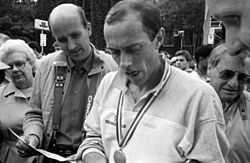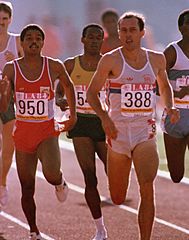Steve Ovett facts for kids

|
|||||||||||||||||||||||||||||||||||||||||||||||
| Personal information | |||||||||||||||||||||||||||||||||||||||||||||||
|---|---|---|---|---|---|---|---|---|---|---|---|---|---|---|---|---|---|---|---|---|---|---|---|---|---|---|---|---|---|---|---|---|---|---|---|---|---|---|---|---|---|---|---|---|---|---|---|
| Born | 9 October 1955 Brighton, Sussex, England |
||||||||||||||||||||||||||||||||||||||||||||||
| Height | 6 ft 0 in | ||||||||||||||||||||||||||||||||||||||||||||||
| Weight | 154 lb | ||||||||||||||||||||||||||||||||||||||||||||||
| Sport | |||||||||||||||||||||||||||||||||||||||||||||||
| Sport | Track | ||||||||||||||||||||||||||||||||||||||||||||||
| Event(s) | 800 metres, 1500 metres, mile, 5000 metres | ||||||||||||||||||||||||||||||||||||||||||||||
| Achievements and titles | |||||||||||||||||||||||||||||||||||||||||||||||
| Personal best(s) | 800 m: 1:44.09 1500 m: 3:30.77 Mile: 3:48.40 3000 m: 7:41.3 2-mile: 8:13.51 5000 m: 13:20.06 |
||||||||||||||||||||||||||||||||||||||||||||||
|
Medal record
|
|||||||||||||||||||||||||||||||||||||||||||||||
Stephen Michael James Ovett, known as Steve Ovett, is a retired British track athlete. He was a famous middle-distance runner, which means he raced in events like the 800 metres and 1500 metres. His biggest achievement was winning the gold medal in the 800 metres at the 1980 Olympic Games in Moscow.
Ovett was known for his incredible speed and competitive spirit. He set five world records for the 1500 metres and the mile run. Between 1977 and 1980, he was so dominant that he won 45 races in a row in these events.
Contents
Early Life and Career
Steve Ovett was born in Brighton, England, on October 9, 1955. As a teenager, he was a very talented athlete. He was good at football but chose athletics because he liked competing as an individual. He quickly showed his talent by winning national school championships in the 400-metre and 800-metre races.
His first major international win came in 1973 at the European Athletics Junior Championships. A year later, at just 18, he won a silver medal at the senior 1974 European Athletics Championships. He also competed in the 1976 Summer Olympics in Montreal, where he finished fifth in the 800-metre final.
A Running Superstar
Becoming a World-Class Athlete
The year 1977 was a turning point for Ovett. He started beating the world's best runners, including the Olympic champion John Walker. At the first-ever IAAF World Cup in Athletics, Ovett showed off his amazing finishing speed. With 200 metres left in the 1500-metre race, he sprinted away from everyone and won easily. A TV commentator said that his "blazing speed" had torn the field apart.
Ovett was known for his incredible range. He could win races at many different distances, from short sprints to longer runs. In 1977, he even won a half-marathon at the last minute when his flight to another event was cancelled. He ran in borrowed shoes and still won easily.
The Great Rivalry with Sebastian Coe
In the late 1970s and early 1980s, Ovett's biggest rival was another British runner, Sebastian Coe. Their races were major events that everyone in Britain watched.
Their first big race against each other was the 800 metres at the 1978 European Championships. Ovett was leading but was surprisingly beaten by Olaf Beyer from East Germany. Coe finished third. After the race, Ovett went up to Coe and asked, "Who the heck was that?" showing his surprise. Ovett later won the gold medal in the 1500 metres at the same championships.
The 1980 Moscow Olympics
The rivalry between Ovett and Coe reached its peak at the 1980 Summer Olympics in Moscow. Everyone was excited to see who would win. Ovett was the favorite in the 1500 metres, and Coe was the favorite in the 800 metres.
In a huge surprise, Ovett won the 800-metre final. He was in sixth place for half the race but powered through the other runners to take the lead and win the gold medal. Coe finished second.
Six days later, it was time for the 1500-metre final. This time, Coe got his revenge. He ran a perfect race and pulled away from Ovett on the final lap to win the gold. Ovett finished in third place, taking home a bronze medal.
Later Career and Challenges
After the Olympics, Ovett and Coe continued to be the best in the world. In 1981, they traded world records in the mile run three times in just nine days.
Ovett's career was sometimes affected by injuries. In late 1981, he had a serious accident while training, which kept him out of competition for a while. He returned in 1983 and set a new world record for the 1500 metres with a time of 3:30.77.
He competed in the 1984 Summer Olympics in Los Angeles but had breathing problems. He bravely made it to the 800-metre final but finished eighth. He also had to drop out of the 1500-metre race due to chest pains.
Even after these difficulties, Ovett had more success. In 1986, he won a gold medal in the 5000 metres at the Commonwealth Games. He officially retired from athletics in 1991.
Life After Running
After retiring, Steve Ovett became a television commentator for athletics events. He has worked for the Canadian Broadcasting Corporation (CBC) since 1992. He now lives in Australia.
In his hometown of Brighton, a bronze statue was put up to honour him in 1987. The original statue was stolen in 2007, but a new one was put up in 2012.
Ovett's son, Freddy, also became a professional athlete. He started as a runner but later switched to professional road cycling.
Personal Best Times
Here are some of Steve Ovett's fastest times for different distances:
| Distance | Time | Date |
|---|---|---|
| 400 metres | 47.5 | 1974 |
| 800 metres | 1:44.09 | 1978 |
| 1000 metres | 2:15.91 | 1979 |
| 1500 metres | 3:30.77 | 1983 |
| Mile | 3:48.40 | 1981 |
| 2000 metres | 4:57.71 | 1982 |
| 3000 metres | 7:41.3 | 1977 |
| Two miles | 8:13.51 | 1978 |
| 5000 metres | 13:20.06 | 1986 |
| Half Marathon | 1:05:38 | 1977 |
See also
 In Spanish: Steve Ovett para niños
In Spanish: Steve Ovett para niños
 | Georgia Louise Harris Brown |
 | Julian Abele |
 | Norma Merrick Sklarek |
 | William Sidney Pittman |


